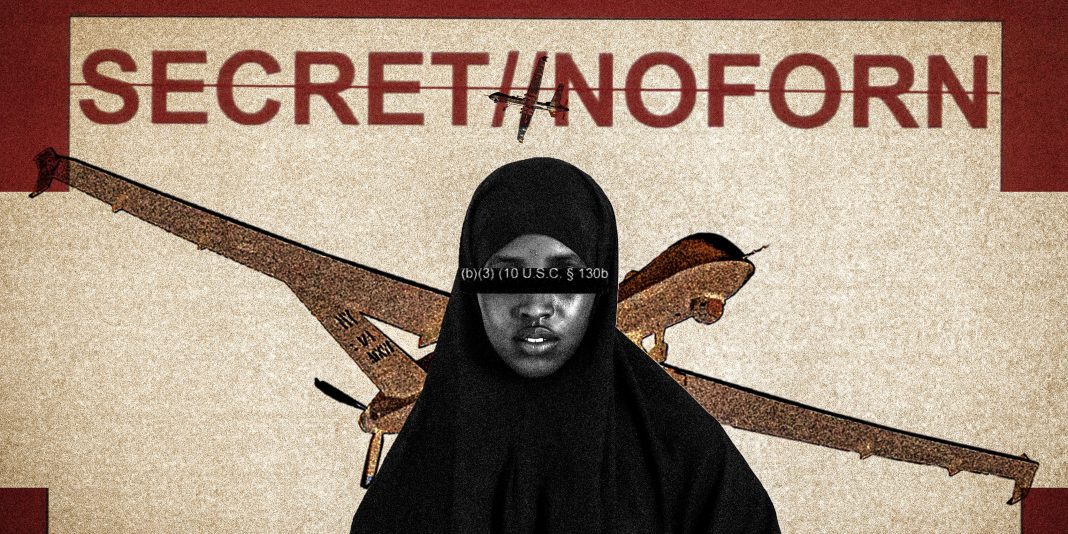The American military has been conducting a continuous military campaign in Somalia for nearly two decades, with nearly 300 drone strikes and commando raids taking place since the 2000s. One particular air attack in April 2018 resulted in the deaths of three, possibly five, civilians, including a woman and child. The U.S. military investigation confirmed their deaths but stated that their identities might never be known.
An investigation by The Intercept revealed the details of this tragic attack, identifying the victims as 22-year-old Luul Dahir Mohamed and her 4-year-old daughter, Mariam Shilow Muse. Despite the family’s attempts to contact the U.S. government and seek accountability, they have never received a response or apology. Abdi Dahir Mohamed, Luul’s brother, expressed his frustration, stating that no one has been held accountable for the innocent lives lost.
A new report by the Center for Civilians in Conflict (CIVIC), shared exclusively with The Intercept, highlights the need for justice and acknowledgment for civilian victims and survivors of U.S. drone strikes in Somalia. The report emphasizes the importance of official acknowledgment, apologies, and financial compensation in helping these individuals move forward from the trauma they have experienced.
CIVIC interviewed 38 individuals who identified as civilian victims of U.S. airstrikes in Somalia, as well as eight civil society experts who work with or represent the injured and survivors. The majority of respondents expressed the need for U.S. accountability, including acknowledgment of the deaths, apologies, and financial amends. They specifically mentioned the Somali custom of diya (blood money) as a form of resolution for disputes.
The number of civilian casualties reported by AFRICOM, the U.S. Africa Command, is significantly lower than the figures reported by Airwars, a U.K.-based airstrike monitoring group. While AFRICOM claims to have killed only five civilians in the past 17 years, Airwars suggests that the real number may be more than 3,000 percent higher.
Following The Intercept’s investigation, numerous human rights organizations, both Somali and international, called on Defense Secretary Lloyd Austin to compensate Luul and Mariam’s family. Several members of Congress, including Sen. Elizabeth Warren and Reps. Sara Jacobs, Ilhan Omar, Barbara Lee, and Jim McGovern, joined the effort.
The response from the Defense Department has been disappointing, compounding the trauma experienced by the survivors. Clare Brown, the deputy director of Victim Advocates International, which represents the families of Somali drone strike victims, criticized the silence from AFRICOM and the U.S. Department of Defense. Brown emphasized that the families have only received information from their lawyers and feel like passive observers in a process they should be at the center of.
The CIVIC report details the various forms of harm experienced by victims and survivors of U.S. drone strikes, including the death of relatives, physical injuries, property damage, economic hardship, and ongoing psychological trauma. Many individuals reported experiencing nightmares and deep emotional distress long after the incidents occurred.
The report also includes 11 recommendations for the U.S. government, urging a comprehensive approach to accountability and amends. CIVIC suggests prioritizing individual amends, such as condolence payments or financial assistance, over community-level compensation. The report highlights the importance of engaging in conversations with affected communities and finding ways to address their needs.
Despite Congress authorizing $3 million annually for ex gratia payments to victims and survivors of civilian harm, the Defense Department has made minimal payments. In 2022, the Pentagon reported no civilian casualties and issued no ex gratia payments. The overdue civilian casualty report for 2023 is still under review, leaving Somali survivors waiting for any form of acknowledgment or apology.
Madison Hunke, CIVIC’s U.S. program officer, criticized the lack of payments and emphasized that the U.S. has the means to provide compensation. She questioned the Department of Defense’s commitment to responding to the harm caused by its operations, not only in Somalia but also in other conflict zones like Iraq and Syria. Hunke emphasized that it is a matter of political will to address these issues and provide the justice that victims and survivors deserve.


